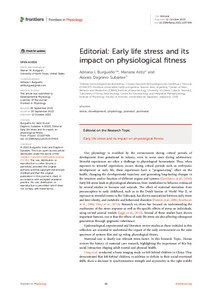Por favor, use este identificador para citar o enlazar este ítem:
https://repositorio.uca.edu.ar/handle/123456789/16408| Campo DC | Valor | Lengua/Idioma |
|---|---|---|
| dc.contributor.author | Burgueño, Adriana Laura | es |
| dc.contributor.author | Astiz, Mariana | es |
| dc.contributor.author | Dagnino Subiabre, Alexies | es |
| dc.date.accessioned | 2023-05-29T09:55:15Z | - |
| dc.date.available | 2023-05-29T09:55:15Z | - |
| dc.date.issued | 2022 | - |
| dc.identifier.citation | Burgueño, A. L., Astiz, M., Dagnino Subiabre, A. Early life stress and its impact on physiological fitness [en línea]. Frontiers in Physiology. 2022, 13:1037409. doi: 10.3389/fphys.2022.1037409. Disponible en: https://repositorio.uca.edu.ar/handle/123456789/16408 | es |
| dc.identifier.issn | 1664-042X (online) | - |
| dc.identifier.uri | https://repositorio.uca.edu.ar/handle/123456789/16408 | - |
| dc.description.abstract | Abstract: Our physiology is modified by the environment during critical periods of development from gestational to infancy, even in some cases during adolescence. Stressful experiences are often a challenge to physiological homeostasis. Thus, when exposure to stressful experiences occurs during critical periods such as embryonic development or early life, these experiences have a “programming” effect on the health, changing the developmental trajectory and generating long-lasting changes in the structure and/or function of different organs and systems (Zambrano et al., 2016). Early life stress leads to physiological alterations, from metabolism to behavior evidenced by several studies in humans and animals. The effect of maternal starvation from preconception to early childhood, such as in the Dutch famine of World War II, or exposure to stressful events in the Holocaust, has shown associations between early stress and later obesity, and metabolic and behavioral disorders (Painter et al., 2006; Roseboom et al., 2006; Flory et al., 2011). Research on stress has focused on understanding the mechanism of the stress response as well as the specific effects of stress on individuals, using several animal models (Jaggi et al., 2011). Several of these studies have shown important features, one is that the effects of early life stress are also affecting subsequent generations through epigenetic inheritance. Epidemiological, experimental and literature review studies as those included in this collection are essential to understand the impact of the early environment on the wide spectrum of systems that end up ruling physiological fitness. Maternal care is clearly one relevant stress factor. In this Research Topic, Dumas reviews the history of maternal care research, highlighting the importance of this key social interaction shaping adult mental and physical health. Ding et al. conducted a brain imaging study on left-behind children in China. They demonstrated that left-behind children, in addition to deficits in their social-emotional skills, show a decrease in synchronization strength and asymmetry in the right middle frontal gyrus during joint attention. The authors suggested that those might be vulnerability factors in the development of leftbehind children. In line with this, Leon el al. provides the first evidence of mother-child epigenetic mark of neglectful caregiving. Nine differentially methylated regions (DMR) were found in common among mothers with neglectful and neglected children, some DMRs contained genes related to childhood adversity, neonatal and infant diabetes, obesity, hypertension, posttraumatic stress, and cancer. | es |
| dc.format | application/pdf | es |
| dc.language.iso | eng | es |
| dc.publisher | Frontiers Media | es |
| dc.rights | Acceso abierto | * |
| dc.rights.uri | http://creativecommons.org/licenses/by-nc-sa/4.0/ | * |
| dc.source | Frontiers in Physiology. 2022, 13:1037409 | es |
| dc.subject | STRESS | es |
| dc.subject | DESARROLLO DEL NIÑO | es |
| dc.subject | DESARROLLO CEREBRAL | es |
| dc.subject | FISIOLOGIA | es |
| dc.subject | METABOLISMO | es |
| dc.subject | GENETICA | es |
| dc.subject | APTITUD FISICA | es |
| dc.title | Early life stress and its impact on physiological fitness | es |
| dc.type | Artículo | es |
| dc.identifier.doi | 10.3389/fphys.2022.1037409 | - |
| dc.identifier.pmid | 36311251 | - |
| dc.contributor.orcid | 0000-0002-9909-9826 | - |
| uca.disciplina | MEDICINA | es |
| uca.issnrd | 1 | es |
| uca.affiliation | Fil: Burgueño, Adriana Laura. Pontificia Universidad Católica Argentina. Facultad de Ciencias Médicas. Instituto de Investigaciones Biomédicas. Consejo Nacional de Investigaciones Científicas y Técnicas; Argentina | es |
| uca.affiliation | Fil: Astiz, Mariana. University of Lübeck, Lübeck. Institute of Neurobiology. Behavior and Metabolism. Center of Brain; Alemania | es |
| uca.affiliation | Fil: Dagnino Subiabre, Alexies. Universidad de Valparaíso, Faculty of Sciences. Institute of Physiology. Centre for Neurobiology and Integrative Pathophysiology. Laboratory of Stress Neurobiology; Chile | es |
| uca.version | publishedVersion | es |
| item.fulltext | With Fulltext | - |
| item.grantfulltext | open | - |
| item.languageiso639-1 | en | - |
| crisitem.author.dept | Facultad de Ciencias Médicas | - |
| crisitem.author.dept | Instituto de Investigaciones Biomédicas - BIOMED | - |
| crisitem.author.dept | Laboratorio de Psiconeuroendocrinoinmunología | - |
| crisitem.author.parentorg | Pontificia Universidad Católica Argentina | - |
| crisitem.author.parentorg | Facultad de Ciencias Médicas | - |
| crisitem.author.parentorg | Instituto de Investigaciones Biomédicas - BIOMED | - |
| Aparece en las colecciones: | Artículos | |
Ficheros en este ítem:
| Fichero | Descripción | Tamaño | Formato | |
|---|---|---|---|---|
| editorial-early-life-stress.pdf | 482,14 kB | Adobe PDF |  Visualizar/Abrir |
Visualizaciones de página(s)
51
comprobado en 27-abr-2024
Descarga(s)
17
comprobado en 27-abr-2024
Google ScholarTM
Ver en Google Scholar
Altmetric
Altmetric
Este ítem está sujeto a una Licencia Creative Commons

